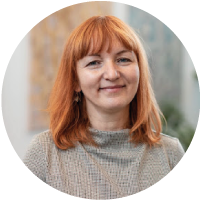
This conference will take place face-to-face (Jonavos st. 66, Kaunas, Lithuania).
The systems perspective in psychology and social work: theory, research and practice
The conference will bring together speakers from the fields of psychology and social work, who will share their ideas and expertise in the conceptualization, research and practice of the systems approach at different levels (individual, family, group, team), in different contexts and within different theoretical paradigms. Presentations, discussions and case examples will deepen participants' understanding of systems thinking and its practical applications and methods.
The speakers and their conference

Rytis PAKROSNIS
Systems Thinking in Solution-Focused Practice: The Role of Interactions in Finding Solutions
Solution-focused practice has developed as part of a broader brief therapy movement influenced by, among other things, systems thinking. Thus, solution-focused practice always emphasizes the importance of social context and social interactions, even when working with a single client. Furthermore, even the client-therapist relationship is sometimes seen as an important part of the client's social system. On the other hand, systemic processes in solution-focused practice are used somewhat differently than other systemic approaches, as they are used exclusively for finding solutions. The presentation aims to discuss how systems thinking is reflected in the theory of solution-focused practice and the technical tools used to use systemic processes in the process of finding solutions, essential to solution-focused practice. .
Doctor of Psychology, EuroPsy certified psychologist, works as an associate professor at the Psychology Department of Vytautas Magnus University (Lithuania) and as a psychologist at the VMU Psychology Clinic and in private practice. Member of the European Brief Therapy Association (EBTA), EBTA Working Group on Definition of Solution Focused Practice and EBTA Working Group on Research Grants. Member of the editorial staff of the journal Solution-Focused Literature. Areas of interest: Research on the results of solution-focused practice; applying and researching solution-focused practice in different domains and contexts (e.g. prevention, self-help); solution-focused hands-on training; positive psychology.

Viktorija ČEPUKIENĖ
The role of self-differentiation and couple relationship satisfaction on partners' emotional health: actor-partner interdependence model
Self differentiation is a cornerstone of Bowen's family systems theory. It describes the systemic and interactional aspects of a person's intrapsychic and interpersonal characteristics. At the intrapsychic level, self differentiation reflects the balance between emotional reactivity and rational thinking in stressful situations, while at the interpersonal level it reflects the balance between autonomy and solidarity. For this reason, differentiation of the self is crucial for personal and dyad well-being. Bowen asserted that individuals tend to form partnerships with those who have similar levels of self-differentiation. This means that the couple with lower self-differentiation generates more diffuse anxiety in relationships and creates a context for the development of discord at the dyadic level and mental health issues at the individual level. The study aimed to examine this theoretical assumption using the actor-partner interdependence model.
Forty-seven couples (a total of 94 study participants, ages 21-53 (female Mage=35.7, SD=7.8; male Mage=37.2, SD=8.3), were recruited online and completed the following measures: Self Differentiation Inventory, Couple Relationship Satisfaction Scale, and 36-tem RAND Health Survey.
Overall, the results, which will be discussed in more detail during the presentation, provided some support for Bowen's theory by demonstrating that lower self differentiation (for both males and females) predicts lower satisfaction with couple relationships.
Doctor of Psychology, Associate Professor in the Department of Psychology, Head of Bachelor Program in Psychology at Vytautas Magnus University (VMU) as well as Psychologist at VMU Psychology Clinic. Her research focuses on couple and family psychology, the research and practice of solution-focused brief therapy, and the association between family dynamics and health.

Jorūnė VYŠNIAUSKYTĖ-RIMKIENĖ
Systems approach to working with families using teamwork in the agency
According to one of the founders of the family therapy movement, Virginia Satir (1916-1988), family therapists treat family pain. When one person in a family (the patient) suffers from pain that manifests in symptoms, all members of the family experience this pain in one way or another (Satir, 1983, p.1) . In the presence of pain, stress, blame, and other dysfunctional patterns arise that prevent family members from seeing "the light in the dark tunnel." Clinical practice shows that when the family is in crisis, in many cases the child becomes the identified patient. In such cases, practitioners observe children and adolescents who exhibit dysfunctional behavior, low grades, poor school attendance, running away, self-destructive behaviors, etc. Reflections on social work practice reveal that working alongside children/adolescents and parents brings about the greatest change in family behavior patterns and helps reduce their pain. Using the systems approach with families increases the inner resources of all family members, and also encourages parents to become aware of the influence of their own behavior on children and adolescents. The objective of the presentation is to reveal the good practices of parallel work with children, adolescents and parents based on the systemic approach in an agency in Lithuania using teamwork.
Associate Professor in the Department of Social Work at Vytautas Magnus University (VMU). Co-founder of the family support center "Darnūs namai", where, together with a team of professionals (social workers, psychologists, psychotherapists, educators), she works as a parent counsellor, social worker and manager. Board member of the International Association for Social Work with Groups (IASWG), co-founder of the Lithuanian chapter of the IASWG. Member and coach of The Virginia Satir Global Network. Research interests: group work with parents (socio-educational groups, support groups), family therapy using the Satir model and Gestalt therapy.

Rasa NAUJANIENE
Reflection on the interactions and interdependencies in the practice of social work: systemic approach in the supervision of social work.
The objective of the presentation is to discuss a case of supervision from the social work community presenting the systemic and social constructionist approach to the practice of supervision. The Systems Approach to Supervision (SAS) was developed as a dynamic model capable of assisting supervisors in a systematic assessment of the learning needs of supervisees and educational supervision interventions (Fleming, 2004). It serves as an organizing conceptual framework or meta-theory for understanding (Friedman & Allen, 2021) that supports understanding the interconnected nature of everything and everyone in systems. Changing something in one part of the system has an effect on the others (Whittington, 2020). SAS views the supervisory relationship as central and considers the nature of the task, the function performed by the supervisor, the nature of the relationship, and contextual factors relevant to the process. According to Holloway (1995), the relationship includes the dimensions of power and involvement, the phase of the relationship and the supervisory contract which includes the establishment of a set of expectations regarding supervisory tasks and functions. .
Associate Professor in the Department of Social Work, Faculty of Social Sciences, Vytautas Magnus University. One of his research and practice interests is the supervision of social work based on systemic and social constructivist approaches. Since 2004, she has supervised individual practitioners, groups and teams in the field of social services and social work.




